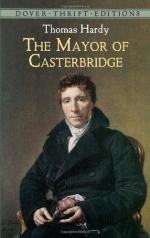He heard, however, but few particulars beyond those known to him already, the incident of the deepest interest on the journey being the soft pealing of the Casterbridge bells, which reached the travellers’ ears while the van paused on the top of Yalbury Hill to have the drag lowered. The time was just after twelve o’clock.
Those notes were a signal that all had gone well; that there had been no slip ’twixt cup and lip in this case; that Elizabeth-Jane and Donald Farfrae were man and wife.
Henchard did not care to ride any further with his chattering companions after hearing this sound. Indeed, it quite unmanned him; and in pursuance of his plan of not showing himself in Casterbridge street till evening, lest he should mortify Farfrae and his bride, he alighted here, with his bundle and bird-cage, and was soon left as a lonely figure on the broad white highway.
It was the hill near which he had waited to meet Farfrae, almost two years earlier, to tell him of the serious illness of his wife Lucetta. The place was unchanged; the same larches sighed the same notes; but Farfrae had another wife—and, as Henchard knew, a better one. He only hoped that Elizabeth-Jane had obtained a better home than had been hers at the former time.
He passed the remainder of the afternoon in a curious highstrung condition, unable to do much but think of the approaching meeting with her, and sadly satirize himself for his emotions thereon, as a Samson shorn. Such an innovation on Casterbridge customs as a flitting of bridegroom and bride from the town immediately after the ceremony, was not likely, but if it should have taken place he would wait till their return. To assure himself on this point he asked a market-man when near the borough if the newly-married couple had gone away, and was promptly informed that they had not; they were at that hour, according to all accounts, entertaining a houseful of guests at their home in Corn Street.
Henchard dusted his boots, washed his hands at the riverside, and proceeded up the town under the feeble lamps. He need have made no inquiries beforehand, for on drawing near Farfrae’s residence it was plain to the least observant that festivity prevailed within, and that Donald himself shared it, his voice being distinctly audible in the street, giving strong expression to a song of his dear native country that he loved so well as never to have revisited it. Idlers were standing on the pavement in front; and wishing to escape the notice of these Henchard passed quickly on to the door.
It was wide open, the hall was lighted extravagantly, and people were going up and down the stairs. His courage failed him; to enter footsore, laden, and poorly dressed into the midst of such resplendency was to bring needless humiliation upon her he loved, if not to court repulse from her husband. Accordingly he went round into the street at the back that he knew so well, entered the garden, and came quietly into the house through the kitchen, temporarily depositing the bird and cage under a bush outside, to lessen the awkwardness of his arrival.




